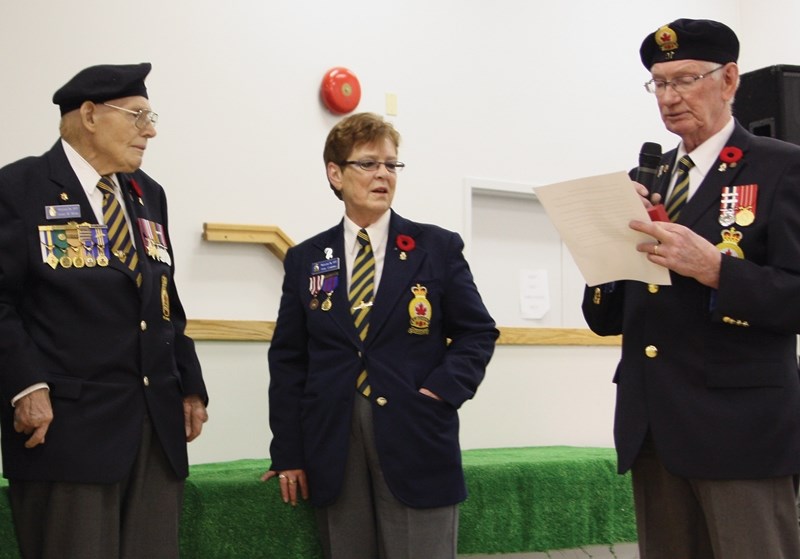It’s not likely that people will start calling him Sir Ernie Wood, but considering the prestigious honour he’s received it would be entirely appropriate.
Seventy years after the end of the Second World War, Ernie Wood has been granted the rank of Chevalier (Knight) in the French Legion of Honour — one of the highest honours that country can bestow.
He was presented with the medal at the Nov. 11 Remembrance Day ceremony in Westlock in front of a crowd of nearly 1,000 people at the Westlock and District Community Hall, and received a well-deserved standing ovation.
The French Legion of Honour was created by Napoleon Bonaparte following the French revolution in 1802, and although it went through some changes as the country went through some transitions, it remains to this day.
It is typically awarded to French nationals, but is also awarded to foreigners who serve France or uphold its ideals.
Wood said last week he still wasn’t sure why, exactly, he got the award but felt it might have to do with the work he did helping members of the French underground in Vichy France in the weeks following the Invasion of Normandy in June 1944.
“I don’t talk about much of it,” Wood said. “I swore an oath not to talk about it.”
The need for secrecy in that type of situation is understandable — in Nazi-occupied France people couldn’t always be up-front about their allegiances for fear of the repercussions, and so secrecy was the order of the day.
Without going into specifics, Wood explained his skills with the Medical Corps were much needed in the French countryside, and he had helped get some of the French resistance fighters to medical aid.
“They’d get ahold of us and we’d meet them somewhere,” he said. “We never went into the headquarters.”
Wood knows from near-personal experience about what could happen if the Nazis caught wind that people weren’t sympathetic to his cause — the man who would become his father-in-law ran a newspaper in Nazi-occupied Holland, and ended up imprisoned for his efforts. The woman who would become his wife had to take her father’s place.
“I guess he put something in there they didn’t like so they threw him in jail,” he said. “Ann took over; she was only 16.”
Wood’s role in the Normandy Invasion itself could, in most people’s minds, be worthy of a medal in its own right. After a stint in the hospital, Wood was placed with the Queen’s Own Rifles for the June 6 invasion. He was on the second boat to land on Juno Beach that day.
But while the award is among the most prestigious someone in his position could ever given, Wood was remarkably humble about the whole affair.
“There’s a lot of other people who could have had this, too,” he said. “I wasn’t the only one doing anything.”
The medal now sits next to many others on his uniform — awarded by governments in Britain, Belgium, Holland, Canada and even one from the mayor of Nijmegen, the Dutch city his wife was from.
Honours or not, to those around the table for morning coffee at the Westlock Legion, he’s still just Ernie, and it’s a role he seems to be quite comfortable in.

